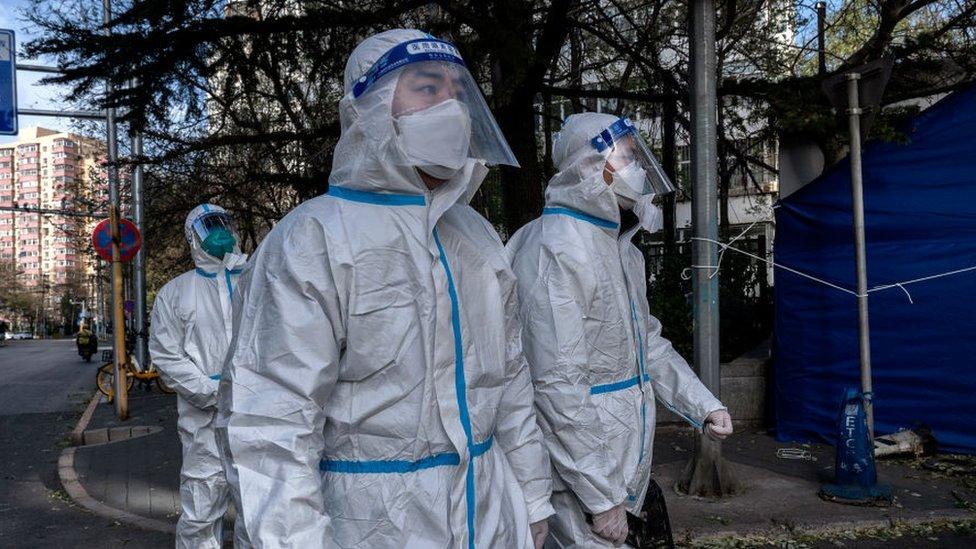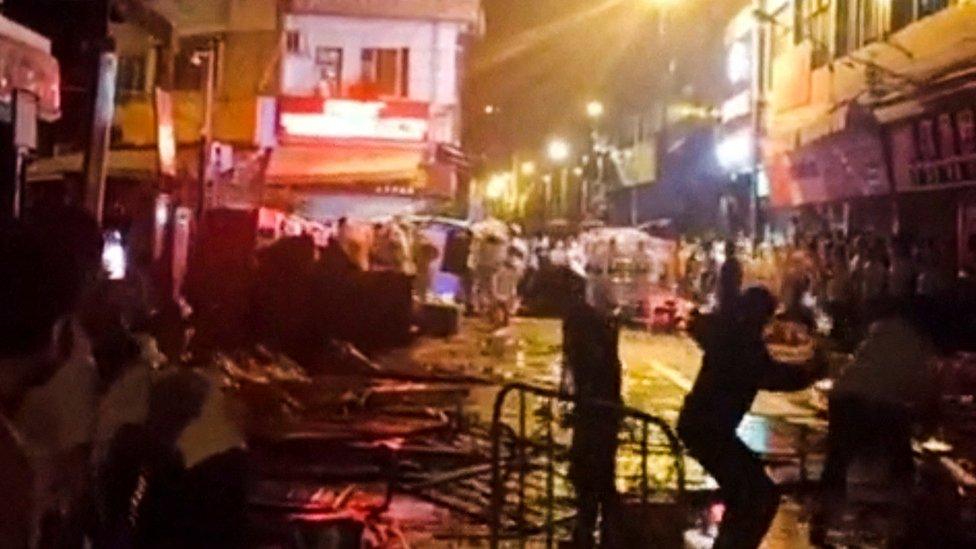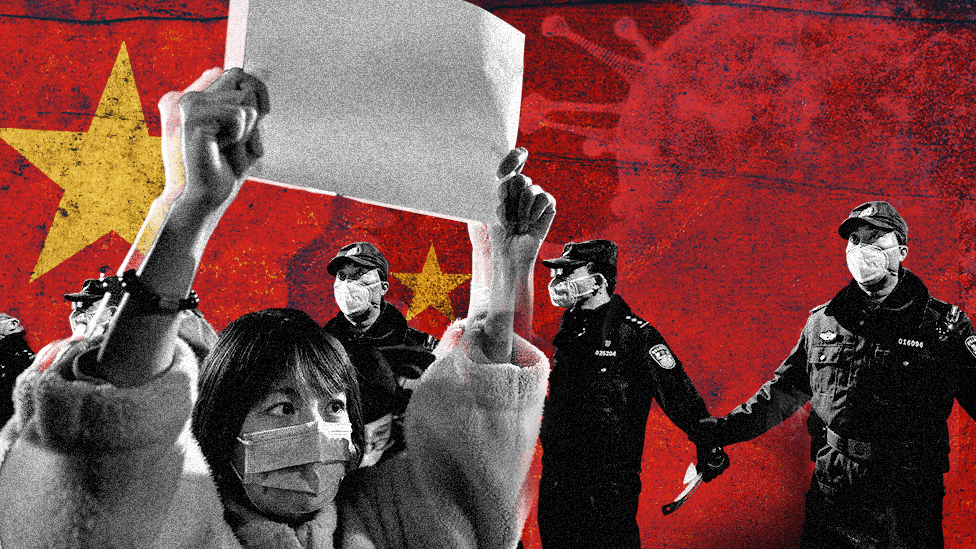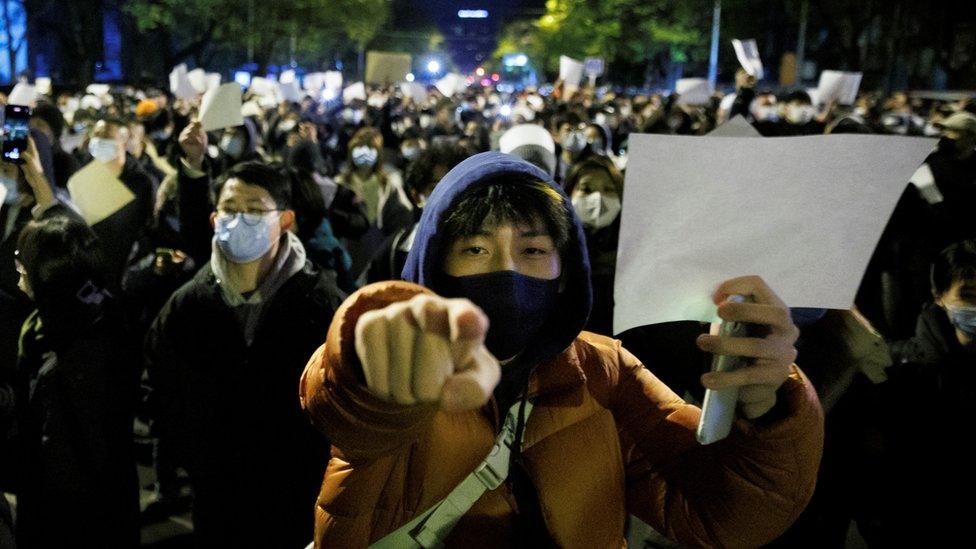China signals ease in Covid policy after protests
- Published

China has signalled a new chapter in its Covid policy
China has signalled a shift in its Covid stance as it moves to ease some virus restrictions despite high daily case numbers.
Dozens of districts in Shanghai and Guangzhou, cities that have seen rising cases, were released from lockdown measures on Thursday.
The country's vice-premier also announced that the country was facing a "new situation".
It comes as China is seeing widespread protests against its zero-Covid policy.
The unrest was triggered by a fire in a high-rise block in the western Xinjiang region that killed 10 people last week. Many Chinese believe long-running Covid restrictions in the city contributed to the deaths, although the authorities deny this.
It led to days of protests across various cities, which have since ebbed amid a heavy police presence.
Restrictions in major cities like Guangzhou were abruptly lifted on Wednesday, hours after the city saw violent protests that resulted in clashes between police and protesters.
A community in the capital Beijing also allowed Covid cases with mild symptoms to isolate at home, according to a Reuters report - a far cry from protocols earlier this year which saw entire buildings and communities locked down, sometimes as a result of just one positive case.
Other major cities like Shanghai and Chongqing also saw some rules relaxed.
It comes as one of China's most senior pandemic officials, vice-premier Sun Chunlan, said the virus' ability to cause disease was weakening.
"The country is facing a new situation and new tasks in epidemic prevention and control as the pathogenicity of the Omicron virus weakens, more people are vaccinated and experience in containing the virus is accumulated," she said, according to a Reuters report.
This comes in stark contrast to an earlier message from authorities that the country needed to maintain a strict zero-Covid policy.
Former state media editor Hu Xijin, who now offers pro-Communist Party commentary on Twitter, insisted the moves showed China was now "speeding up to cast aside large-scale lockdowns".
Following the lifting of lockdown measures in many parts of Guangzhou, Lijin Hong, an associate professor at Sun Yat-sen University, said it would "take a while for the city to recover. Yet is is awesome to see Guangzhou city again."
China has in recent days recorded its highest number of daily Covid cases since the pandemic began - with more than 36,000 cases recorded on Wednesday.
However, the numbers are still tiny for a country of 1.4 billion people and officially just over 5,200 have died since the pandemic began.
That equates to three Covid deaths in every million in China, compared with 3,000 per million in the US and 2,400 per million in the UK, although direct comparisons between countries are difficult.

Zero-Covid policy has set up vicious cycle
Analysis by Rachel Schraer, BBC health and disinformation reporter
In China, the policy of so-called "dynamic zero-Covid" - taking action wherever Covid flares up in order to eliminate it - does not have a clear endpoint, and doesn't seem to have moved with the changing science and reality of the virus.
Plenty of political and ideological reasons have been suggested for that.
But it's not helped by the vaccines on offer not being as effective, and take-up not being as strong as some other countries, especially among the groups who need it most.
It's also set up a vicious circle - long periods without mixing mean even once vaccinated, people are less likely to be exposed to the virus and benefit from the "hybrid immunity" which - studies suggest - affords the highest protection.
It's this wall of protection built up over nearly three years through natural exposure and effective vaccines that have made Covid something that most of the rest of the world is now willing to live with, without resorting to legally-enforced restrictions.

Watch: Riot police in hazmat suits clash with protesters in China.
Related topics
- Published30 November 2022

- Published7 December 2022

- Published28 November 2022
